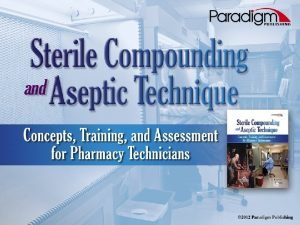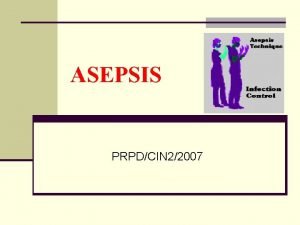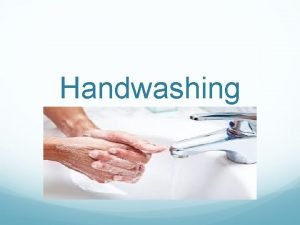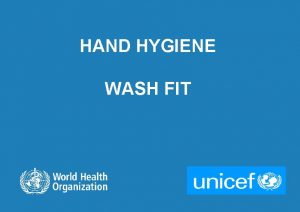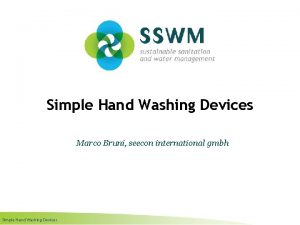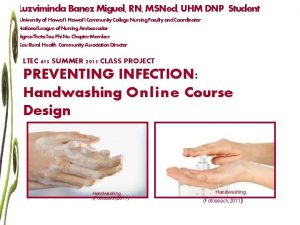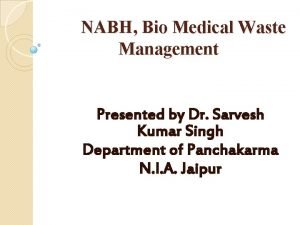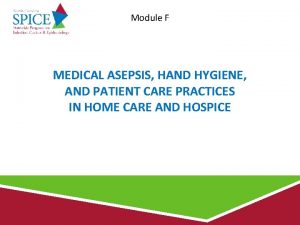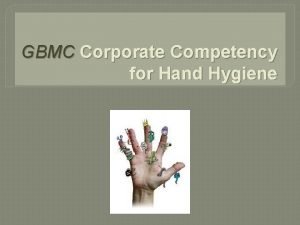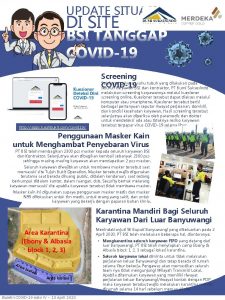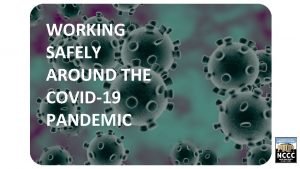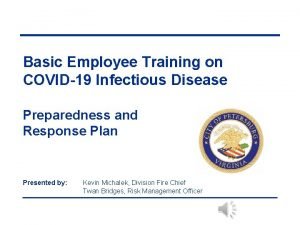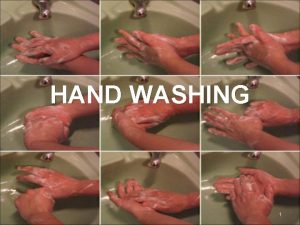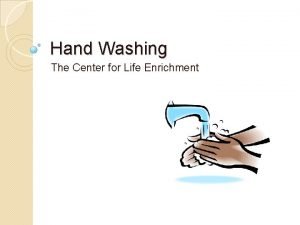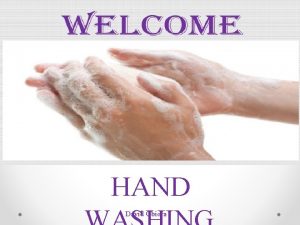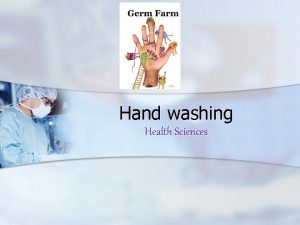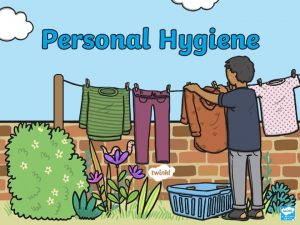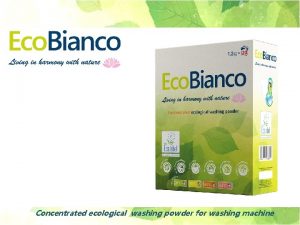COVID19 and Hand Washing Special Needs Individuals Individuals

















- Slides: 17

COVID-19 and Hand Washing

Special Needs Individuals � Individuals with special needs are at a high risk for developing serious complications from COVID-19 � Many individuals have severe underlying conditions including GI issues, diabetes, heart and lung diseases.

What are Universal Precautions? � The term Universal Precautions refers to an approach to infection control where everyone is treated as if they were known to be infectious with blood borne pathogens, or carriers of diseases (i. e. HIV, COVID-19) � Using Universal Precautions means protecting yourself from any all diseases that a person may have.

How do I use Universal Precaution? � Frequent hand-washing � Use disposable gloves � Use a CPR mask if available � Use Red plastic garbage bags to dispose of hazardous waste.

Why should I use Universal Precaution? � Universal precaution reduces the chance of coming in contact with both airborne and bloodborne pathogens, in turn reducing the risk of contracting infectious disease such: � COVID-19

How does COVID-19 spread? � From person to person between people who are in close contact (within 6 ft) � Through respiratory droplets produced when an affected person cough, sneezes or talks � Droplets can land in the mouth or noses of people who are nearby or possibly be inhaled. � May be spread by people who are not showing signs

Airborne Pathogens � Airborne Pathogens are pathogenic microorganisms that are respiratory in tact and can call diseases. � They are coughed or sneezed into the air by an infected person. � If they are breathed in, they can cause an infection.

Handwashing � This is the single most important means of preventing disease transmission. � Germs grow on the hands and under fingernails. It is important to keep nails trimmed and clean at all times. � Remove all jewelry before washing your hands or applying gloves.

Handwashing Clean your hands often � Wash your hands with soap and water for at least 20 seconds � If soap and water are not available, use a hand sanitizer that contains at least 60% alcohol. �

When should I wash my hands? � � � Before applying gloves After removing gloves After contact with any bodily fluid After handling any object that may be soiled with blood, salvia or bodily fluids After using the bathroom, or helping another person with toileting Before drinking, eating, or smoking Before preparing, serving or handling food. Before and after feeding or assisting in the feeding of participants Before and after giving any imitate personal care When hands are obviously soiled. When in doubt, wash!

How to wash your hands. � Gather all necessary supplies � Remove jewelry � Turn on water and regulate temperature � Wet hand, rinse with water running 2 -3 inches above the wrist. � Rinse from the clean to dirty parts � Hold hands down so that the water will run downward to the finger tips and prevent backflow over un-rinsed skin.

Hand-washing � � � � Once hands are completely wet, apply soap. Rub hands together with a rotating frictional motion, for AT LEAST 1 minute. Wash at least 2 -3 inches above the wrist. Be sure to get soap under nails/between fingers. Make sure to wash the back of the hands. Rinse hands with running water. Rinse from the clean to dirty parts Hold hands down so that the water will run downward to the fingertips and prevent backflow over un-rinsed skin.

Hand-Washing � Consider your hands contaminated unless Thoroughly washed. � Pat hands dry with a clean paper towel and discard in wastepaper receptacle. DO NOT touch the wastepaper receptacle. � Apply hand lotion as necessary or as instructed.

Why should I wear gloves? � Keep hands free from potentially infectious materials. � To prevent the spread of infection and disease to other program participants, staff and visitors. � To protect wounds from contamination. � To prevent exposure to the COVID-19 virus

Wear a face mask � The CDC recommends wearing a cloth mask to cover when you are others. � You could spread even if you don’t feel ill � The cloth is meant to protect other people in case you are affected.

Clean and Disinfect � Clean frequent touched surfaces daily � Including doorknobs, bedrails, tables, light switches, countertops, handles, desk, phones, keyboards, toilets, faucets and sinks.

Employees Must wear gloves when: � � � Providing direct care involving contact with all body fluids such as, fecal matter, urine, saliva, tears, semen, vaginal fluids, etc. Handling all laundry/dishes The caregiver has an open wound, scrape, rash on his/her arm. Working with irritating solutions such as Cavi wipes, bleach or cleaning solutions. Given personal care in which direct contact with body fluids is likely (urine, feces, saliva, menses) Applying topical
 Garbing procedure
Garbing procedure N
N Osha hand washing
Osha hand washing Objective of hand washing
Objective of hand washing Simple hand washing devices
Simple hand washing devices Hand washing steps for nurses
Hand washing steps for nurses Nabh biomedical waste management
Nabh biomedical waste management What is medical asepsis
What is medical asepsis Handwashing procedure with rationale
Handwashing procedure with rationale Gbmc infoweb
Gbmc infoweb Http://apps.tujuhbukit.com/covid19/
Http://apps.tujuhbukit.com/covid19/ Do if you covid19
Do if you covid19 Covid19 athome rapid what know
Covid19 athome rapid what know What do if test positive covid19
What do if test positive covid19 Vaksin covid19
Vaksin covid19 Primary needs and secondary needs
Primary needs and secondary needs Satisfaction
Satisfaction Primary needs and secondary needs
Primary needs and secondary needs
